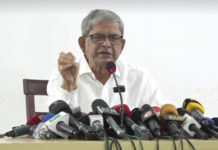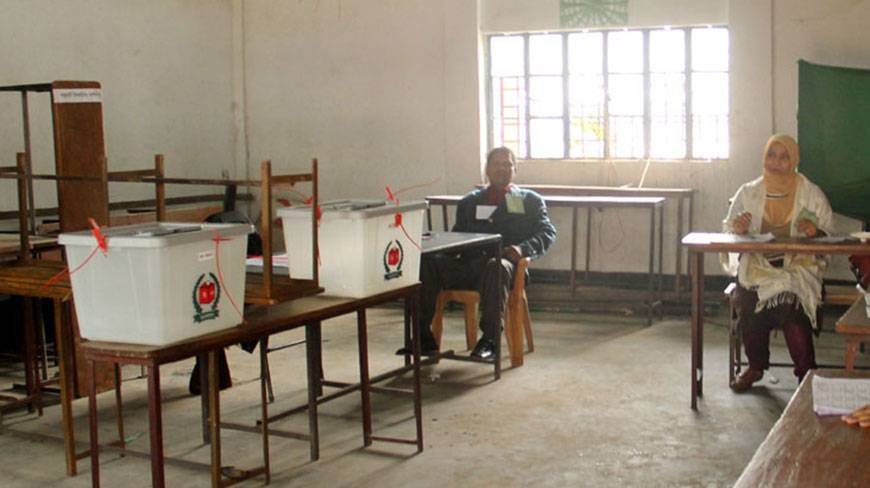
Surendra Kumar Sinha.– New Age file photo
Bangladesh National Alliance president Nazmul Huda has filed a case with Shahbagh police station accusing Justice Surendra Kumar Sinha of demanding bribe from him and misusing power while the former chief justice has applied for political asylum to the United States.
The news of the case against the former chief justice circulated on Monday when the Anti-Corruption Commission said that they had began an inquiry against Justice Sinha’s brother Ananta Kumar Sinha for his alleged involvement in money laundering and accumulating illegal wealth.
‘Barrister Nazmul Huda filed the case on September 27 for corruption and misuse of power,’ said Shahbagh police station officer-in-charge Abul Hasan, declining to disclose any further information about the case.
He said that they had sent the case documents to the Anti-Corruption Commission as the allegations were connected to corruption.
Nazmul Huda told New Age on Monday that he filed the case as Justice SK Sinha in 2017, when he was in the chief justice, demanded bribe from him.
‘He [Justice Sinha] called me in his chamber and demanded the bribe. As declined to pay, he took some unconstitutional steps against me misusing his power as the chief justice,’ Huda said.
On November 8, 2017, the High Court reduced Nazmul Huda’s jail term to four years from seven years, finding him guilty of taking Tk 2.40 crore in bribe from owners of two construction firms in 2005.
It had also reduced the jail term of Huda’s wife Sigma Huda, also human rights activist.
The court had also directed Nazmul Huda to surrender to the trial court in 45 days after receiving the verdict.
Nazmul Huda said that he could not surrender to the trial court since the High Court was yet to release full verdict.
The High Court gave the verdict after rehearing two appeals filed by Huda and Sigma against the convictions handed down by a special judge’s court on August 26, 2007.
On March 20, 2011, another High Court bench had set aside the convictions of Huda and Sigma on the ground that they were prosecuted illegally on orders issued by the commission secretary when there was no commissioners at the commission.
On December 1, 2014, after hearing the commission’s appeal, the Appellate Division stayed their acquittals and directed the High Court to rehear their appeals considering the merit of the trial court verdict. Justice Sinha was in the Appellate Division then.
This was the first out of two dozen cases sent to the High Court Division by the Appellate Division for rehearing.
Huda filed the case against Justice Sinha when his political alliance, Bangladesh National Alliance, expressed its will to take part in the next national election with the ruling Awami League-led alliance.
A former Supreme Court Bar Association president, Huda, also founding member of the Bangladesh Nationalist Party, resigned as BNP vice-chairman in 2012. He was a communication minister in BNP-led government in 2001-2006.
The 21st chief justice of the country, Justice Sinha was allegedly forced to leave the country in mid-October 2017 and was forced to resign as the chief justice on November 10, 2017 reportedly for penning the Appellate Division’s unanimous verdict upholding a High Court judgement striking down the 16th amendment to the constitution.
He recently published an autobiography ‘A Broken Dream: Rule of Law, Human Rights and Democracy’ in which he wrote about his early life, his appointment as chief justice of Bangladesh, the separation of power and the independence of judiciary, 16th amendment to the constitution and its aftermath, ethical values of judges of the highest court and politicians, and the circumstances behind his resignation.
In the book, Justice Sinha claimed that he was forced to resign.
Justice Sinha, in an interview published by the British Broadcasting Corporation online on Sunday, admitted that he decided to seek political asylum although seeking asylum being a chief justice would raise question ‘in the country’, ‘about the government’ and ‘about values’. ‘But who would ensure my security,’ he asked.
Asked why he thought that he was insecure, Sinha said that he had to seek refuse abroad as there was threats from religious extremists for giving verdicts in different cases involving extremism.
He said that extremists tried to kill him, attacked his wife, set fire to his village home and killed his two dogs.
Justice Sinha claimed that his life was at risk from an intelligence agency. He also claimed that the ‘DGFI forcibly’ sent him abroad considering that he was a threat to the government.
He reportedly claimed at a function in Washington on Saturday that he had no status in the United States. ‘I have sought political asylum but there has been no decision yet,’ he said at a programme on launching of his autobiography in Washington DC.
Justice Sinha left the country in October 2017 for Australia when he was serving as the chief justice of Bangladesh.
When asked about Justice Sinha’s statement involving intelligence agencies, Inter Services Public Relations Directorate director Lt Col Alamgir Kabir said that he would not make any comment on the matter.
On Monday, Anti-Corruption Commission public relations officer Pranab Kumar Bhattacharjee said the inquiry into the allegations on Justice Sinha’s brother Ananta Kumar Sinha’s involvement in money laundering and illegal wealth accumulation was assigned to commission’s assistant directors Gulshan Anower and Silvia Ferdus.
He said that the inquiry began following an allegation that Ananta built a three-storey house in New Jersey in the United States spending $2.80 lakh.
On October 26, the commission imposed bans on foreign visits by seven current and former Farmers Bank Ltd officials for their alleged involvement in transferring Tk 4 crore to former Justice SK Sinha’s bank account.
The Farmers Bank officials include former managing director and chief executive officer AKM Shameem, first vice-president Swapan Kumar Roy, senior executive vice-president Gazi Salauddin, vice-president M Lutful Haque, assistant vice-president Shafiuddin Askaree Ahmed, executive officer Umme Salma Sultana and Gulshan branch manager Ziauddin.
On April 25, the commission launched an inquiry into an anonymous complaint that Tk 4 crore had been transferred to the bank account of the former chief justice from two Farmers Bank accounts.
Source: New Age.









